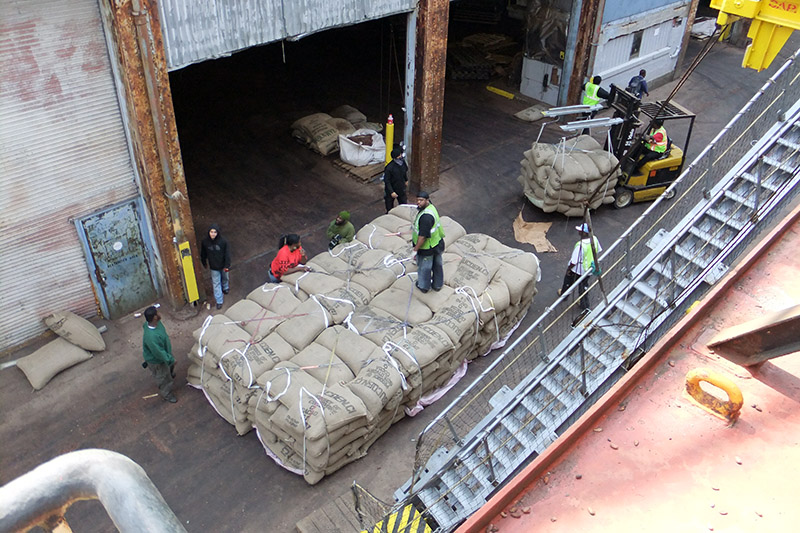My training as a journalist from the time I was in my twenties has taught me much about the limitations of human perspective. It has also taught me to examine viewpoints from all sides. That can be a challenge to do in such a polarized time. But I try. We are all human and have limits of knowledge and understanding, though. Reformer Martin Luther once taught that we all fall short of what God wants us to be.
I am grateful to have done research and reporting in a dozen countries and 30 U.S. states. I once worked 10 years as a volunteer shipboard visitor with Homeland Security credentials. During that time, I regularly went to dozens of highly secure terminals to greet seafarers from all over the world in the Port of Philadelphia. They and the hard work they did to bring us “stuff” we need really inspired me and helped my perspective. I am grateful to Seamen’s Church Institute of Philadelphia and South Jersey for that opportunity.

Dockworkers offload bags of cocoa beans from the cargo ship Lady Anthula in 2012.
I watched cargo ships offload materials like fertilizer, rock salt, asphalt, cocoa beans and Kia automobiles from all over the world. Philadelphia has been the largest importer of Chilean grapes. Ships bearing bananas for the Philadelphia region are commonplace. No wonder. My research indicates the U.S. is the largest consumer of bananas in the world. They are grown in the U.S., but the largest purveyors of the fruit are Honduras, Costa Rica, Guatemala, Ecuador and Mexico. Favorable climate seems to be a factor for their leadership. We consume everyone’s bananas! Cocoa beans, used to manufacture a variety of U.S. chocolate products, arrive in the Port of Philadelphia regularly. The largest grower of cocoa beans is the Ivory Coast in Africa. (Yes, some cocoa beans of high quality are made in Hawaii. And that is wonderful!) Why are most cocoa beans in the world grown in the Ivory Coast and Ghana and not in the U.S.? I’ve learned that’s because the climate in those countries highly favors such production.
Kia cars have a U.S. production site in Georgia. But the cars or parts included in them are manufactured in Pakistan, South Korea (company headquarters), China, India, Slovakia, Mexico, Japan and Vietnam.
Research has informed me that in the U.S. rock salt is mined in Livingston, NY, Texas and Michigan. In March of 2013, a ship I visited at the Riverside Terminal in the Port of Philadelphia brought us Rock Salt from Brazil. That ship was one of 13 to visit the Port, as I recall, because of the unusually harsh winter. Municipal trucks were lined up at Riverside to get the salt, offloaded through large funnels onto a conveyer belt to reach the trucks. Why was rock salt imported from a place like Brazil instead of being furnished out of Livingston or Grand Saline, TX? I learned it was likely because the demand imposed by a harsh winter outstripped the capacity of the U.S. to produce enough salt on its own. Price was possibly a factor as well.
The iPhone I carry in my pocket has components or manufacturing involving 63 countries including the U.S., according to Columnist Tom Friedman of the New York Times.
Why write about all this? 1.) My experience as a journalist and in visiting seafarers in the Philadelphia Port has taught me that the world and its economy is a complicated, exciting place full of people who are striving to work together. That’s such good news! 2.) Historically I have found the world to be remarkably diverse, filled with people who are sometimes different from me, but from whom I can learn a great deal. 3.) I have always thought the reality that we are globally interdependent, neighbors serving and being served by neighbors, is something to celebrate. (I don’t believe all those countries are “ripping us off.”) Check out my book Neighbors Revisited, available through this web site, to get my thoughts.
Now it feels like the world view I have learned to embrace is often scorned and thrust aside. Is being myopic and ingrown becoming the new value?

Leave a Comment